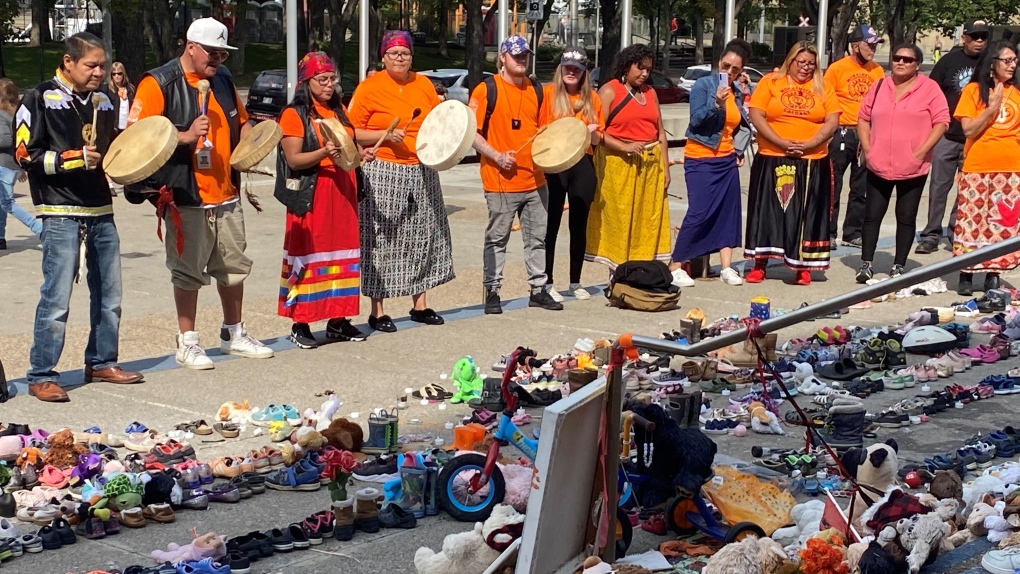
2nd woman found dead in English Bay: Vancouver police
For the second time in as many days, a woman's body was found near Vancouver's shoreline Monday.
Some people will have not one, but two statutory days off this month.
The National Day for Truth and Reconciliation, on Sept. 30, will follow Labour Day, on Sept. 6, for the first time.
The day has been created to give everyone an opportunity to recognize and commemorate the legacy of residential schools, which more than 150,000 First Nations, Metis and Inuit children were forced to attend between the 1870s and 1997.
As a federal statutory holiday, it is a designated paid holiday for federally regulated employees. That means people who work for the federal government or in workplaces such as banks, the post office or Via Rail are entitled to have the day off, or receive holiday pay if they do work.
Although there are about 10 federal statutory holidays, only five are paid days off for all employees in the country. Those are: New Year’s Day; Good Friday; Canada Day; Labour Day and Christmas Day.
Provinces can also designate holidays. That’s why Manitoba has Louis Riel Day and Quebec has St. Jean Baptiste Day, for example.
In addition, private companies and organizations can decide if they want to honour optional or unofficial holidays. For example, some stores may choose to be closed on Boxing Day or Remembrance Day even in provinces where they are not designated holidays.
So the National Day for Truth and Reconciliation will be a paid holiday for federally regulated employees. The government of the Northwest Territories announced that its public servants, including teachers will also observe the holiday. And British Columbia has advised provincial public-sector employers to honour the day. In B.C., many public services will operate at reduced levels, but most schools, post-secondary institutions and some health sector workplaces and Crown corporations will be closed.
Most of the provinces have said they’re not officially observing the day as a paid day off.
The idea of having a such a day was one of the 94 recommendations in the Truth and Reconciliation Commission’s final report, which was released in June 2015. The day itself was officially created on June 3 this year, when Bill C-5 was passed by both houses of Parliament.
The move came shortly after the remains of about 215 children were discovered in late May by the Tk'emlúps te Secwépemc First Nation, on the grounds of the former Kamloops Indian Residential School.
More remains have been found since then, and more searches are underway across the country. The original report estimated that 6,000 children died while attending the schools, although many people expect the number to be much higher.

For the second time in as many days, a woman's body was found near Vancouver's shoreline Monday.
Men from Edmonton and Calgary are accused of threatening to kill some of Canada's top government leaders.
Canadian athletes attempting to reach the podium at the Paris 2024 Olympic Games will also be looking fashionable for the entire world to see.
Vice-President Kamala Harris has secured the support of enough Democratic delegates to become her party's nominee against Republican Donald Trump, according to an Associated Press survey taken in the aftermath of President Joe Biden's decision to drop his bid for re-election.
New Zealand's coroner has ruled that four of its citizens died after ordering products from an Ontario man who is facing murder charges for selling poisonous substances.
A Toronto woman who allegedly took 'intimate' photos of an individual who was getting a massage has been charged with voyeurism, police say.
The name of Calgary’s new event centre was unveiled on Monday. The arena will be called Scotia Place.
If you're trying to get up to speed on Vice President Kamala Harris' swift emergence as Democrats' possible nominee this fall, you really need to know your memes.
No one knows the importance of selecting the right running mate better than Vice President Kamala Harris.

A swarm of bees living in a lamppost in Winnipeg’s Sage Creek neighbourhood has found a new home for its hive.
Around 100 acres of Manitoba Crown Land near the Saskatchewan border is being returned to the Métis community.
Nova Scotia is suspending the licensed Cape Breton moose hunt for three years due to what the province is calling a “significant drop” in the population.
A well-known childhood prank known as 'nicky nicky nine doors,' or 'ding dong ditch,' has escalated into a more serious game that could lead to charges for some Surrey, B.C. teens.
It's been more than a month since their good friend was seriously hurt in an accident and two teens from Riverview, N.B., are still having a hard time dealing with it.
Halifax bridges have collected thousands of coins from around the world.
A donated clawfoot bathtub has become the preferred lounging spot for a pair of B.C. grizzly bears, who have been taking turns relaxing and reclining in it – with minimal sibling squabbling – for the past year.
A pair of cemetery investigators are cleaning and preserving as many gravestones they have permission to work on, as they conduct their research and document gravestones.
After more than three years, a B.C. woman has been reunited with a lost family heirloom.
 A temporary memorial for victims of Canada's residential schools is blessed by Indigenous elders in a pipe ceremony in Calgary on Aug. 26, 2021. Orange shirts are often worn on Sept. 30 to honour residential school survivors. (THE CANADIAN PRESS/Bill Graveland)
A temporary memorial for victims of Canada's residential schools is blessed by Indigenous elders in a pipe ceremony in Calgary on Aug. 26, 2021. Orange shirts are often worn on Sept. 30 to honour residential school survivors. (THE CANADIAN PRESS/Bill Graveland)